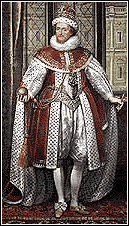
...his Majestie with the advise of the Lordis of his Secreit Counsall statutis and ordanis that in all tyme cuming the first day of the yeir sal begin yeirlie upoun the first day of Januare....
While this may come as a surprise to those who associate Scottish New Years with the Hogmany festival held on January 1, historically the Scots had always celebrated the New Year four days after the Vernal Equinox, on March 21, also known as the beginning of Spring, or Alban Eiler. Anglicized as "Lady Day", the traditional Scottish New Year was just one of many ancient Druid religious practises that survived Christianity's "civilizing" influence since Roman times. Based on the moon and the passing of the seasons, these so-called "pagan" celebrations were more important to the ordinary Scot than any man-made calendar could ever claim.
According to Brian D. Osborne and Ronald Armstrong, in their wonderful book "Scottish Dates" (Birlinn, 1996), the decision to change the Scottish New Year in 1599 was, "significant, both for its immediate objective and as evidence of James VI's international outlook."
At the time, many European states were making the change to the Gregorian calendar as problems with the Julian calendar became evident with each passing year.
When the Julian calendar was first devised two thousand years ago, its namesake, Julias Ceaser ruled there should be a leap year every four years without exception. While that may have seemed proper in 1 AD, in practise, what happened was that by the end of the first millenium, the calendar was off by eight full days.
This threw off important religous celebrations such as Easter, which would normally have been celebrated by the season and the phases of the moon. The 13th century English philosopher Roger Bacon raised the issue with Pope Clement IV, but nothing was done until the mid 1500s and the Council of Trent.
In the fascinating Internet website An Introduction to Calendars, webmaster Bill Hollon explains the reasons why the Julian calendar was no longer relevant to Medieval Europeans:
According to the Trent council, two main things needed to be accomplished regarding the calendar: reestablish the old vernal equinox date of March 21 and determine the Easter moon's 14th day. Easter would then be observed on the following Sunday. Following some of the council's recommendations, Pope Pius V modified both the intercalation rule (editor's note: practise of making arbitrary divisions and inserting extra "intercalary" days or months) and lunar tables used to determine Easter's date.
Into the frey came Aloysius (Giglio) Lilius, the Vatican librarian, as well as the mathematician and astronomer, Father Christopher Clavius. Lilius, who is considered to be the principal author of the Gregorian Calendar, convinced Pope Gregory XIII to correct the seasonal errors by dropping ten days during the next forty years.
While there is still some debate over whether it should have been ten or eleven days, Pope Gregory agreed with Lilius. In the Papal Bull Inter Gravissimas, dated February 24, 1582, Gregory shortened October, 1582, by ten days. Hence, Thursday, October 4, 1582, was followed by Friday, October 15, 1582. The reformed Calendar - aptly called the Gregorian Calendar - was immediately adopted by the Catholic countries of Italy, Poland, Portugal and Spain.
Given that the hard feelings over the Protestant Reformation were still smouldering in Reform Europe, it is not surprising that Protestant-ruled countries resisted what they likely perceived an evil Catholic scheme to change the basis of time measurement.
But, one by one, they relented as it became obvious the Gregorian calendar made sense at a time when seasonal Christian celebrations rooted in ancient pagan rituals were still celebrated according to the lunar cycles - not, as Ceaser hoped, according to his man-made Julian Calendar.
On December 17, 1599, eighteen years after the first Catholic countries changed to the Gregorian calendar, Scotland followed suit. In 1698, German professor Erhard Weigel convinced Germany and the Netherlands to make the switch. Surprisingly, England and its colonies did not change their calendar until 1752, even though James VI jointly ruled England and Scotland for many years following 1600.
And although it took three centuries, eventually, most Western states and some Asian countries adopted the Gregorian Calendar. There were some holdouts - the Greek Orthodox Church did not move to the Gregorian calendar until the beginning of the 20th century. It took the Russian revolution in 1918 to make the Russians move to the reform calendar, and the Eastern Orthodox Church still uses the Julian Calendar today.
MMJ, December, 1999
For further information about the ancient Druid religious festivals practised in pre-Gregorian Calendar Scotland, go to The Coligny Tablet
Links:
The History of the Calendar Encyclopedia.com
Pope Gregory's Calendar Changes
Pope Gregory XIII The Catholic Encyclopedia
Pope Gregory MSN Encarta Encylopedia
The Council of Trent MSN Encarta Encylopedia
The Reformation MSN Encarta Enyclopedia
Roger Bacon from the Global Encyclopedia |
Thursday, December 26th, 2019
Attention visitors: Tartans.com is back. Please note that this is a snapshot of the site as it existed nearly 20 years ago and you may encounter broken links; we are still combing through the site and correcting those as we find them. Please also note that some sections are currently not functional, primarily the discussion forums/clan chat boards.
|
** HOME - First Time Visitors - Glossary - - Contact Us ** Awards | Bibliography | Clan Calendar | Clan Chat | Clan Finder | History | Famous Scots | Genealogy | Great Hall of the Clans | Links | News and Features | Scots on the Net | Search | Site Map The Gathering of the Clans
Copyright 1995- Tartans.com - All Rights Reserved. |
 Four hundred years ago, on December 17, 1599, something extraordinary happened when
Four hundred years ago, on December 17, 1599, something extraordinary happened when